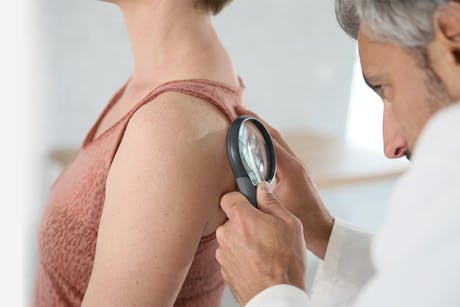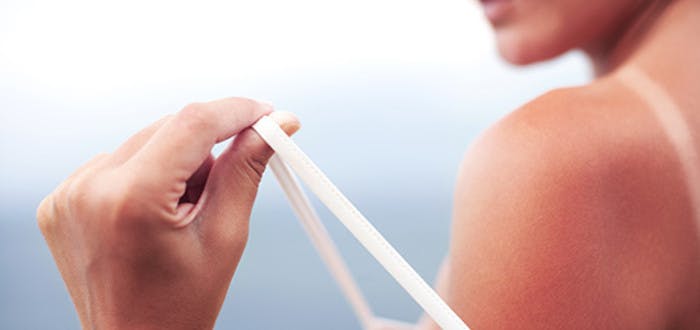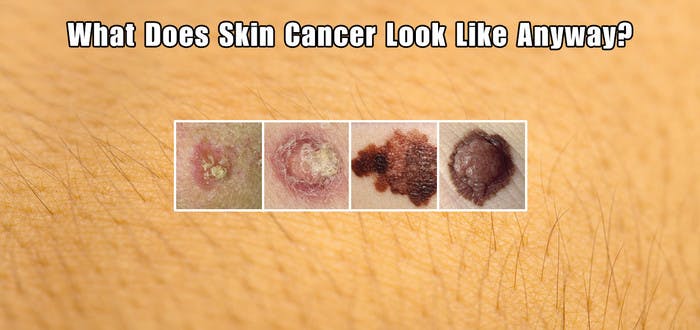Who should get a skin cancer screening and how often?
It’s important to be aware of any changes in your skin, especially if you work outside or do a lot of outdoor activities — not just in the summer but year-round. Self-examine your skin every month to look for anything that is different. People who are considered high risk should be examined by a health care provider. Learn how you can be smarter about sun exposure.

How to prevent skin cancer and detect it.
There are smart ways to block the sun’s rays. Follow them to protect yourself from the sun. It’s also important to be aware of any changes in your skin, especially if you work outside or do a lot of outdoor activities — not just in the summer but year-round. Self-examine your skin every month to look for anything that is different.
Protect your skin.
There are things you can do to stay protected from the sun’s rays. Wear sunscreen of SPF 30 or higher, sunglasses, a wide brim hat, and clothes that cover most of your body. Stay in the shade, under a tree or umbrella, and check your skin often for any changes.
Who should be screened:
If you spend time in the sun, particularly if you work outdoor, you should be screened. You should also be screened regularly if you have a lighter natural skin color, blue or green eyes, blond or red hair, and skin that burns, freckles, reddens easily, or becomes painful in the sun. See a dermatologist if you notice any changes in your skin that look abnormal.


Stay on top of any skin changes.
Is that rough spot something you should worry about? Here’s a look at four types of skin cancer and their descriptions.
- Basil cell carcinoma — Can look like a waxy or white bump, a scaly patch or an unhealed sore.
- Malignant Melanoma — The most serious and potentially deadly skin cancer. It can appear as a pigmented patch or bump, usually as an irregular mole.
- Solar Keratosis — A precancerous condition that looks like a small rough spot on skin.
- Squamous Cell Carcinoma — This could appear as an unhealed sore, a red nodule or rough bump.
Causes
What causes skin cancer?
People who are at a higher risk:
- Are exposed to excessive ultraviolet (UV) light from the sun, tanning lamps, or tanning beds
- Have a history of frequent sunburns (especially before age 20)
- Have many moles (particularly those that are abnormal)
- Have light-colored skin, freckles, light hair, and/or blue or green eyes
- Are Caucasian (Caucasians are 10 times more likely to have melanoma than African Americans)
- Have a family or personal history of malignant melanoma
- Are women younger than age 40 and men older than age 40
- Have xeroderma pigmentosum (a rare, inherited condition)
Learn more
Learn more about skin cancer:
These links give you skin cancer prevention tips, and they help you learn how to identify moles that could be warning signs and how to stay sun-safe:

Seven Steps to Save Your Skin
Read more
Do You Have Enough “Skin in the Game” When It Comes to Sun Safety?
Read more
6 Facts That Will Get Under Your Skin
Read more
10 Ways to Look Good in a Bathing Suit Forever
Read more
What Does Skin Cancer Look Like Anyway?
Read more
6 Things You Can’t Control That Could Hurt You
Read more
7 Tips to Keep You From Exposing Yourself
Read more
5 Skin Cancer Warning Signs In Moles
Read more
7 Tips To Keep Kids Safe in the Sun
Read more
4 Ways to Work Outside Without Killing Yourself
Read more
What Are the Odds?
Read more
Focus on Skin Cancer Prevention
Read more
How to Prevent a Sneaky Sunburn
Read more
Skin Cancer: What Young Adults Need to Know
Read more
Some Spots You Don’t Want to Find
Read moreTestimonials
Stories about skin cancer:
Helpful links
Quit Smoking
There are two ways to get help to quit smoking from specially trained counselors: Call the Delaware Quitline by phone at 1-866-409-1858 or visit QuitSupport.com.
Learn moreHealthy Living
Live better. Our Healthy Lifestyle Map will show you where you can find fresh local produce at farmers’ markets and how to stay active at local fitness centers and parks.
View Healthy Lifestyle MapActivity Lowers Your Risk for Certain Cancers
Access the Centers for Disease Control and Prevention Physical Activity and Cancer chart to see how regular physical activity can lower your risk for eight cancers.
Learn more


